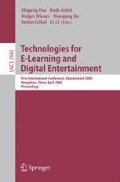Abstract
In this paper, we report on our experiences in using an animated competitive game with simulated physics to teach Artificial Intelligence techniques in an undergraduate computer science course. Students develop intelligent controllers for simulated vehicles, which compete with each other in a tournament. The simulation includes a real-time visualisation of the contests, and the students’ solutions utilise an AI toolkit that provides animated displays showing the internal workings of their controllers in parallel with the simulation. The result is a learning experience that engages students’ enthusiasm, and helps them to development mental models of the AI algorithms.
Access this chapter
Tax calculation will be finalised at checkout
Purchases are for personal use only
Preview
Unable to display preview. Download preview PDF.
References
About Learning, www.aboutlearning.com/ (Last accessed December 19, 2005)
Atkin, M.S., Westbrook, D.L., Cohen, P.R.: Capture the Flag: Military Simulation Meets Computer Games. In: Papers from the AAAI 1999 Spring Symposium on Artificial Intelligence and Computer Games. Technical Report SS-99-02, pp. 1–5. AAAI Press, Menlo Park (1999)
Brand, J.E.: Gameplay Australia 2005. Gold Coast, Queensland, Bond University (2005)
Byrne, R.W., Whiten, A. (eds.): Machiavellian Intelligence: Social Expertise and the Evolution of Intellect in Monkeys, Apes and Humans. Clarendon Press, Oxford (1988)
Campbell, M., Hoane, A.J., Hsu, F.-h.: DeepBlue. In: Schaeffer, J., van den Herik, J. (eds.) Chips Challenging Champions: games, computer and Artificial Intelligence, pp. 3–9. Elsevier, Amsterdam (2002)
Combes, B., Ring, J.: “If you help us build it, we will come!” - The role of the Teacher Librarian as an online curriculum facilitator and innovator. In: Virtual paper presented at the ASLA Online I: Constructing Communities of Learning and Literacy Online Conference (May 2004)
Durkin, K., Aisbett, K.: Computer games and Australians today. Office of Film and Literature Classification, Sydney (1999)
Fogel, D.: Blondie24: Playing at the Edge of AI. Morgan Kaufmann Publishers, San Francisco (September 2001)
Fraser, W.J.: The foundations of continuous assessment: its link to performance-based, authentic, competence-based and outcomes-based assessment. University of Pretoria, Pretoria (1999) (unpublished article)
Friedman, T.: Making sense of software: computer games and interactive textuality. In: Jones, S. (ed.) Community in Cyberspace, Sage, Thousand Oaks, CA (1994)
Hauser, M.: Minding the behaviour of deception. In: Whiten, A., Byrne, R. (eds.) Machiavellian Intelligence II. Cambridge University Press, Cambridge (1997)
Jayakanthan, R.: Application of computer games in the field of education. The Electronic Library 20(2), 98–102 (2002)
Kumar, D.: Pedagogical dimensions of game playing. ACM Intelligence Magazine 10(1) (2000)
Lawrence, R.: Teaching Data Structures using Competitive Games. IEEE Transactions on Education 9(3), 205–260 (2004)
Lepper, M.R., Malone, T.W.: Intrinsic motivation and instructional effectiveness in computer-based education. In: Snow, R.E., Farr, M.J. (eds.) Aptitude, learning and instruction. Cognitive and affective process analysis, vol. 3, Erlbaum, Hillsdale (1987)
Li, S.: Rock-em, sock-em Robocode! (Last accessed September 18, 2004), http://www-106.ibm.com/developerworks/java/library/j-robocode/index.html
Malan, S.P.T.: The ’new paradigm’ of outcomes-based education in perspectives. Journal of Family Ecology and Consumer Sciences 28, 22–28 (2000)
McCarthy, B.: Welcome to 4MAT (Last accessed October 13, 2004), www.aboutlearning.com/
Michael, D., Chen, S.: Serious games - games that educate, train, and inform, Boston, MA, Thomson Course Technology PTR (2006)
Muller, M.: Computer Go survey (2001), http://www.cs.ualberta.ca/~mmueller/cgo/survey
Negnevitsky, M.: Artificial Intelligence: A Guide to Intelligent Systems. Pearson, Harlow (2002)
Noda, I., Matsubara, H., Hiraki, K., Frank, I.: Soccer server: A tool for research on multiagent systems. Applied Artificial Intelligence 12, 233–250 (1998)
Pillay, H.: An investigation of cognitive processes engaged in by recreational computer game players: Implications for skills of the future. Journal of Research on Technology in Education 34(3), 336–351 (2002)
Schaeffer, J., van den Herik, J. (eds.): Chips Challenging Champions: games, computer and Artificial Intelligence. Elsevier, Amsterdam (2002)
Schaeffer, J., van den Herik, J.: Games, computers and artificial intelligence. In: Schaeffer, J., van den Herik, J. (eds.) Chips Challenging Champions: games, computer and Artificial Intelligence, pp. 3–9. Elsevier, Amsterdam (2002)
Shannon, C.: Programming a Computer for Playing Chess. Phil. Mag. 41, 256–275 (1950)
Sweetser, P.: Current AI in Games: A Review (Last accessed September 18, 2004), http://www.itee.uq.edu.au/penny/Game%20AI%20Review.pdf
Tesauro, G.: Temporal difference learning and TD-gammon. Journal of the ACM 38(3), 58–68 (1995)
Turing, A.M.: Computing machinery and intelligence. Mind 59, 433–460 (1950)
von Neumann, J., Morgenstern, O.: The Theory of Games and Economic Behavior. Princeton University Press, Princeton (1944)
Whiten, A., Byrne, R.W. (eds.): Machiavellian Intelligence II: Extensions and Evaluations. Cambridge University Press, Cambridge (1997)
Author information
Authors and Affiliations
Editor information
Editors and Affiliations
Rights and permissions
Copyright information
© 2006 Springer-Verlag Berlin Heidelberg
About this paper
Cite this paper
Hingston, P., Combes, B., Masek, M. (2006). Teaching an Undergraduate AI Course with Games and Simulation. In: Pan, Z., Aylett, R., Diener, H., Jin, X., Göbel, S., Li, L. (eds) Technologies for E-Learning and Digital Entertainment. Edutainment 2006. Lecture Notes in Computer Science, vol 3942. Springer, Berlin, Heidelberg. https://doi.org/10.1007/11736639_61
Download citation
DOI: https://doi.org/10.1007/11736639_61
Publisher Name: Springer, Berlin, Heidelberg
Print ISBN: 978-3-540-33423-1
Online ISBN: 978-3-540-33424-8
eBook Packages: Computer ScienceComputer Science (R0)

